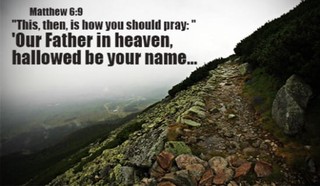
Change Translation
- Recent Translations
- All Translations
Mǎtaìfúyīn 6:4
Share
Listen to Mǎtaìfúyīn 6:4
Settings
Scripture Text Size
4
Yào jiào nǐ shīshĕ de shì xíng zaì ànzhōng , nǐ fù zaì ànzhōng chákàn , bì bàodá nǐ . ( yǒu gǔ juàn zuò bì zaì míngchù bàodá nǐ )
Mǎtaìfúyīn 6:4 Meaning and Commentary
Matthew 6:4
FOOTNOTES:
F17 Misn. Shekalim, c. 5. sect. 6. Mainnon. Hilch. Eracin, c. 2. sect. 12.
F18 T. Bab. Bava Bathra, fol. 9. 2.
F19 T. Bab. Chagiga, fol. 5. 1.
F20 Maimon. Hilch. Mattanot Anayin, c. 10. sect. 15.
That thine alms may be in secret
May be done in secret, and be kept a secret. The allusion seems to be to the secret chamber, where money was brought privately for the relief of the poor.
``There were two chambers in the sanctuary, the one was (Myavx tkvl) , "the chamber of secrets", and the other the chamber of vessels: the chamber of secrets was that into which pious persons put (yavxb) , "in secret", and the poor children of good men were maintained out of it privately F17.''The Jews say many things in favour of doing alms privately.
``Greater, (say they F18,) is he that gives alms (rtob) , in secret, than Moses our master.''They tell us F19, that
``R. Jannai seeing a certain man give Zuz (a piece of money) to a poor man publicly, said unto him, it would have been better, if thou hadst not have given him anything, than to have given him in this manner.''This was the practice of the ancient religious Jews, to give their alms privately; but the Scribes and Pharisees had brought that practice into disuse, and which our Lord labours to restore; adding, for encouragement,
and thy Father, which seeth in secret;
beholds all secret actions, and knows the secret springs of actions,
himself shall reward thee openly;
in the great day of account, before angels and men, when all secret things shall be brought to light, and every good man have praise of God. This duty, of giving alms to the poor, is mentioned by Christ before prayer to God; it may be for this reason, because it was usual to give alms before prayer.
``The great, or famous men, among the wise men, used to give a Prutah (a small piece of money) to a poor man before every prayer, and after that they prayed; as it is said, "I shall behold thy face in righteousness" F20.''
F17 Misn. Shekalim, c. 5. sect. 6. Mainnon. Hilch. Eracin, c. 2. sect. 12.
F18 T. Bab. Bava Bathra, fol. 9. 2.
F19 T. Bab. Chagiga, fol. 5. 1.
F20 Maimon. Hilch. Mattanot Anayin, c. 10. sect. 15.
Taken from John Gill's Exposition of the Bible
Unlock Deeper Insights: Get Over 20 Commentaries with Plus! Subscribe Now
Mǎtaìfúyīn 6:4 In-Context
2
Suǒyǐ nǐ shīshĕ de shíhou , bùkĕ zaì nǐ qiánmian chuīhào , xiàng nà jiǎmàowéishànderén , zaì gōngtáng lǐ hé jiēdào shǎng suǒ xíng de , gùyì yào dé rén de róngyào . wǒ shízaì gàosu nǐmen , tāmen yǐjing dé le tāmende shǎngcì .
3
Nǐ shīshĕ de shíhou , búyào jiào zuǒshǒu zhīdào yòushǒu suǒ zuò de .
4
Yào jiào nǐ shīshĕ de shì xíng zaì ànzhōng , nǐ fù zaì ànzhōng chákàn , bì bàodá nǐ . ( yǒu gǔ juàn zuò bì zaì míngchù bàodá nǐ )
5
Nǐmen dǎogào de shíhou , bùkĕ xiàng nà jiǎmàowéishànderén , aì zhàn zaì gōngtáng lǐ , hé shízìlùkǒu shàng dǎogào , gùyì jiào rén kànjian . wǒ shízaì gàosu nǐmen , tāmen yǐjing dé le tāmende shǎngcì .
6
Nǐ dǎogào de shíhou , yào jìn nǐde neì wū , guān shang mén , dǎogào nǐ zaì ànzhōng de fù , nǐ fù zaì ànzhōng chákàn , bìrán bàodá nǐ .
Videos for Mǎtaìfúyīn 6:4
Public Domain


